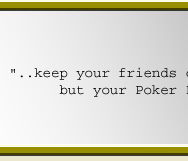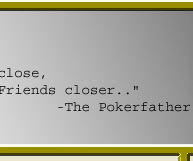Copyright 2005 Full
Tilt Poker
September 12, 2005
(View all Online Poker
Lessons)
Poker Lesson: Third
Street in Seven Stud
Author: Perry Friedman
For those of you who are unfamiliar with seven-card
stud, there are some betting quirks in the game that you should
understand. During the opening round of betting (also called "third
street"), the player with the lowest up card is forced to
act first. There are two choices: Bet the "bring-in"
amount (which is usually one-third of the full bet) or "complete"
the bet (make it a full bet). If the player chooses to bet the
bring-in amount, another player has the option of completing the
bet. Note that this is not considered a raise, because it is only
increasing the initial bet to one full bet. This means there is
still a bet and three remaining raises allowed during the opening
round.
You should almost never bring in for a completion
in Stud Hi, except in very rare tournament situations. There are
a number of reasons for this, including the need to conceal the
strength of your hand and the desire to keep your options open
later in the round.
If you make it a habit only to bring in for a completion
when you have a good hand, an astute player will pick up on this
and will steal from you every time you don't complete the bring-in.
Conversely, if you always complete the bet, you are throwing away
money when you are forced in, which is usually when you have a
bad hand since you already have the lowest up card.
Furthermore, bringing in for a completion limits
your betting options. If you bring in for the minimum and someone
else completes the bet, you can raise back for a full bet, whereas
your opponent can only complete for a partial bet. You can also
decide to slow play your hand if someone completes. Completing
the bet exposes you to being raised back a full bet. By always
bringing in for the minimum, you do not give away the strength
of your hand and leave your options open on third street.
When playing in a live ring game, I will seldom
even look at my down cards when I am the bring-in. Whether or
not you look at your cards first is a matter of personal preference,
but by not looking, you can't give a tell. However, one of the
important aspects of stud is being aware of what cards have already
been dealt out to your opponents. If you decide not to look at
your hole cards, you should still peruse the table and take inventory
of what cards are already out.
For some people, cataloguing all the upcards may
be a tedious and exhausting process, and they will prefer to look
at their downcards first so that they immediately know which key
cards will improve their hand, or if they even have a playable
hand at all. The only flaw with this shortcut is that when you
do have a playable hand, you need to be aware of what your key
cards are and know which cards will help or hurt your opponents.
I recommend getting in the habit of always mentally keeping track
of all of the up cards.
In heads-up play, keeping track of the cards is
much simpler; they are always there to see and you don't need
to remember who folded which cards. This makes it even less important
to check your down cards before acting.
In online
play, you will always be aware of your down cards, but you
should still get in the practice of tracking your opponents' cards.
One way to keep the game interesting - and to work on your skills
at the same time - is to track all the cards even when you are
out of the hand. As the hand progresses, try to figure out what
hands your opponents are likely playing. At the showdown, you
can see how well your reading skills are coming along.
Stud can be a very enjoyable and interesting game,
but it relies less on intuition and more on keeping your mind
focused and your eyes open.
Full
Tilt Poker Bonus Code

Downloaded
from the World Wide Web on October 8, 2005:
http://www.fulltiltpoker.com/proLessons.php?lesson=26
|








